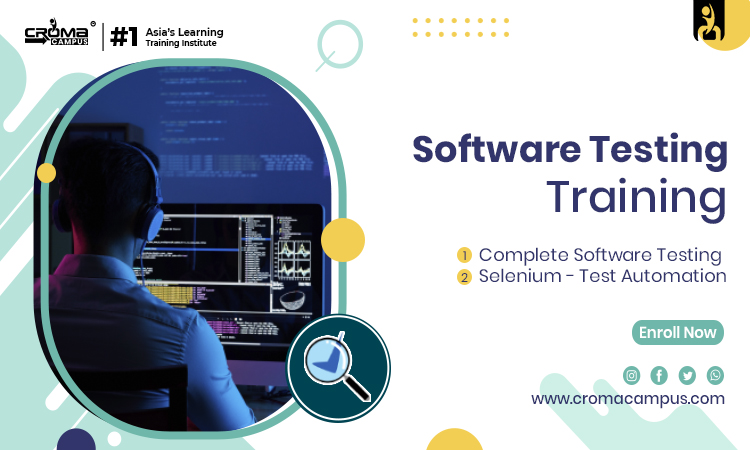Have you ever wondered how software is tested to ensure it works correctly? Well, that’s where software testing comes in.
It’s like checking a cake to make sure it’s baked perfectly before serving it to guests. Let’s explore what a testing course is all about in the simplest way possible and discover how you can learn about it through software testing course as well as understand how to prepare for interviews in software testing.
What is Software Testing?
Software testing is like being a detective for computer programs – you investigate to find any problems or “bugs” that might be hiding in the code.
Just like how you’d check every ingredient in a recipe to make sure it’s right, software testing checks every part of a program to make sure it works the way it’s supposed to. Here is why it’s important:
- Finding Bugs: Software testing helps find and fix bugs or problems in programs before they cause trouble for users. It’s like catching a mistake in a recipe before serving the dish.
- Ensuring Quality: Testing ensures that software meets quality standards and works as expected, making users happy and keeping them coming back for more.
- Saving Time and Money: Fixing problems after a program has been released can be expensive and time-consuming.
Getting Started with Software Testing Course
If you’re interested in learning about software testing, there are courses available that can teach you all the essentials.
Understanding the Basics
- What is Software Testing? Learn about the basics of software testing, including its goals, principles, and importance in the software development process.
- Types of Testing: Explore different types of software testing, such as manual testing, automated testing, unit testing, integration testing, and regression testing.
Learning Testing Techniques
- Test Case Design: Discover techniques for designing test cases, which are like step-by-step instructions for testing different parts of a program.
- Bug Reporting: Learn how to report bugs or problems found during testing in a clear and detailed way so that developers can understand and fix them.
Tools and Technologies
- Testing Tools: Explore testing tools and software used by testers to automate tests, track bugs, and manage testing processes.
- Programming Languages: Get familiar with programming languages commonly used in software testing, such as Python, Java, or JavaScript.
Putting It All Together
- Practice Projects: Work on practice projects and exercises to apply what you’ve learned in real-world scenarios and build your skills.
- Collaboration: Collaborate with other students and participate in group projects to learn from each other and gain practical experience.
Advanced Topics in Software Testing
Once you’ve mastered the basics, you can explore more advanced topics and techniques in software testing:
- Test Automation
- Performance Testing
- Security Testing
- Continuous Integration and Continuous Testing
Exploring Interview Preparation for Software Testing Roles:
Test Engineer:
Testing Methodologies: Demonstrate your understanding of various testing methodologies such as manual testing, automated testing, and exploratory testing.
Testing Tools: Showcase your proficiency in testing tools such as Selenium, JUnit, or TestNG. Practice using these tools to create test cases, execute tests, and analyze results.
Quality Assurance Analyst:
Quality Assurance Processes: Discuss your knowledge of quality assurance processes and best practices for ensuring software quality throughout the development lifecycle.
Defect Management: Highlight your experience in defect tracking and management using tools like JIRA or Bugzilla.
Automation Tester:
Scripting Skills: Showcase your proficiency in scripting languages such as Java, Python, or JavaScript for writing automated test scripts.
Continuous Integration: Discuss your experience with continuous integration tools like Jenkins or Travis CI. Highlight how you’ve integrated automated tests into the CI/CD pipeline to achieve faster feedback loops.
Performance Tester:
Performance Testing Concepts: Demonstrate your understanding of performance testing concepts such as load testing, stress testing, and scalability testing.
Performance Monitoring Tools: Showcase your experience with performance monitoring tools like JMeter, LoadRunner, or Gatling.
Software Test Manager:
Leadership Skills: Highlight your experience in leading and managing testing teams, including test engineers, QA analysts, and automation testers. Be ready to discuss how you’ve motivated and empowered team members to achieve testing objectives.
Risk Management: Discuss your approach to risk-based testing and mitigation strategies for managing project risks. Be prepared to explain how you’ve identified and prioritized testing activities based on project risks and constraints.
Conclusion
Software Testing is a crucial part of the Software Development Engineer in Test process, ensuring programs work correctly and reliably. By taking software testing course, you can gain the skills and knowledge needed to become a successful tester and contribute to the quality and success of software projects. So, why wait? Start your software testing journey today and become a valuable asset to any development team.

